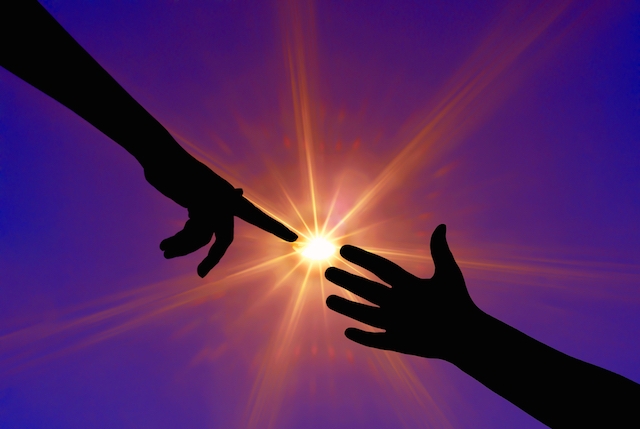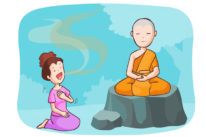
“What separates privilege from entitlement is gratitude.” ~Brené Brown
I think most of us can reflect vividly on the turning point that brought us toward where we are today.
Often during these transitional periods, major life events push us to pursue the peace of mind we have always dreamed of having.
For me, this journey started my sophomore year in college. My father had just passed away from suicide, and subsequently I was diagnosed with major depression for the second time in my college career.
It wasn’t the most pleasant diagnosis to receive, but I was relieved that I now had a name for the physical and emotional turmoil I was enduring. I was deeply depressed and I knew I needed to look beyond myself for healing.
Determined not to let my sadness restrain me, I reached for help through therapy, self-care, and spiritual rituals.
I immersed myself in daily affirmations and habits to keep myself motivated. Initially, each action felt cumbersome and forced, but gradually I witnessed the awakening of something beautiful.
At the time I did not know that these changes marked the beginning of a love affair with myself.
Almost a year later, I attended spiritual ceremonies during my study abroad in Brazil. After six months of enchantment and spiritual awakening, I left feeling profoundly moved and in love with the woman I had become.
When I moved back home, I faced the new transition of getting acclimated to my life in the states again. Oddly enough, when speaking about my spiritual encounters to others, I felt isolated and misunderstood.
It was as if I was a different person forced to adapt to an environment that had not changed since I left.
I had come back a new woman ready to take the world by storm, only to be greeted by the lethargic energy of loved ones stuck in a rut. It was as if time had stood still, and many of my family members and friends appeared to be in the same place they were when I left.
My experience of being in another country and meeting new people allowed me to see things in ways that others couldn’t. It allowed for me to make strides toward dealing with my own personal demons.
It was hard to admit at the time, but the honest truth was that my healing experience was a product of my privilege.
The privilege of being a single woman in her twenties with the free time and expendable income to “find myself,” while my counterparts remained at home and dealt with more practical matters.
I wanted to know how I could share my spiritual awakening without condescending people or isolating myself from them. With a lot of trial and error, I began to shift my perspective.
If you’ve also been privileged enough to change your life for the better, and you’d like to leverage your experiences to help others, you may find these practices useful, as well.
Be aware.
First, I had to acknowledge the impact of my privilege. Not everyone has the ability to embark on costly and time-consuming endeavors for the sake of their well-being. I had to realize that this was an indulgence that many people may never be able to experience due to myriad personal and socio-economic factors.
Avoid defensiveness.
I had to learn to stop being defensive. When others called me out on my privilege, I often responded with “I paid my dues.” or “I worked hard to get here.”
All of these statements may very well have been true, but let’s not deny the fact that life is not always fair. Many people work hard but will never experience the freedoms that others enjoy.
When people check you for being privileged, acknowledge that they are speaking from their perspective. Listen to their truth and learn to take criticism with grace.
Let go of pity.
I sometimes refer to it as “escapist guilt.” It’s a feeling that may overwhelm people who are able to participate in endeavors that most of their counterparts can’t experience.
While it is fundamental to be aware of the privilege you hold, it is important that you do not use this as an opportunity to feel sorry for others. Let go of pity and replace it with compassion. Pitying someone involves seeing their condition or circumstance as separate from yourself. By practicing compassion, you are able to play an active role in their lives.
Ask yourself, how can I use my experiences as a tool to impact others in a positive way?
Be humble.
Humility better enables you to help others with your story. Humility is what bonds us; it allows us to impact others in a profoundly humane way. Humility is not about silencing or hiding personal achievement. Be proud of who you are and where you have been, but always be gracious.
Acknowledge that none of us is superior to anyone else. Live a life of inclusion and recognize that everyone is in a different part of this journey called life.
You simply do not have all the answers, so recognize all interactions as a two way street, where both parties can learn from another.
When you share your experiences with the utmost humility and gratitude, this will resonate with people and they will naturally gravitate toward your light.
Lastly, recognize that your experiences were not just for you.
The best things in life are shared. Take others along the journey with you by inspiring them and helping them tackle their own goals. Your story may encourage others to travel, to face a fear, or to just be themselves.
Sharing is our greatest privilege, and our stories are the greatest gifts we can bestow upon each other.
Helping hand image via Shutterstock
About Bolajoko Collins
Bolajoko is an energy healer always looking for new and exciting ways to reach her fullest potential. In her spare time she can be found writing erotica or making quirky adjustments to classic vegan recipes. She can be followed through her radical self-empowerment blog where she chronicles her passion for herbalism and spirituality. Visit her at www.beinggoddess.com.













 Though I run this site, it is not mine. It's ours. It's not about me. It's about us. Your stories and your wisdom are just as meaningful as mine.
Though I run this site, it is not mine. It's ours. It's not about me. It's about us. Your stories and your wisdom are just as meaningful as mine. 